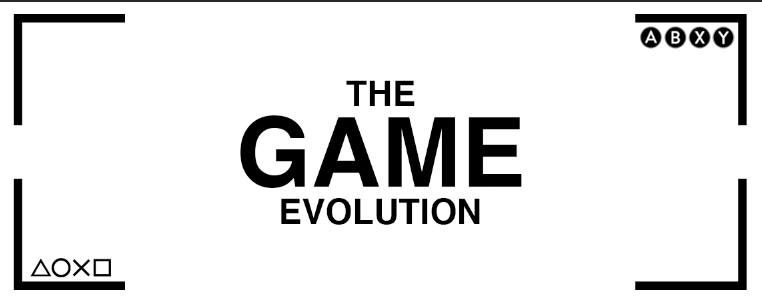First of all, let me just say that I absolutely loved this game. Played it for the first time a couple of weeks ago and it is probably one of the most atmospheric and engrossing games I have played to date, even though it was released in 2007.

Now, if you haven’t played the game I recommend you take a quick look at this plot summary.
As the title indicates, I am going to talk about the choice mechanics in the game, and how these mechanics tie into the games narrative – both the narrative directly related to our protagonist Jack, but also the story of what happened to Rapture.
Games can have interesting stories, no doubt about it, but in video games it is important not to forget that these stories also have to fit in with the mechanics – its ludic elements (game elements). In worst-case scenarios, a discord between these two elements can ruin a game experience. What I found with Bioshock was that, not only did the mechanics work nicely with the story throughout most of the game, but also, it was done in a curious way that by the end of the game might make you think more about the act of gaming.
Now, Rapture was built by Andrew Ryan. The underwater city was an envisioned utopia for the best in society, and it was based on Ayn Rand’s (A Russian born philosopher and novelist) Objectivism. Also, see the similarity? Ayn Rand / Andrew Ryan. We enter Rapture after this envision utopia has, as always seems to be the case, turned into a dystopian society. Now genetic manipulation has run amok, and the people still alive are better fit for a freak show than an actual human society (mainly due to the fact that there is barely anything human about their personalities left). These people have become predators, also in the game known as Splicers, and their prey are the Little Sisters, protected by the Big Daddies.
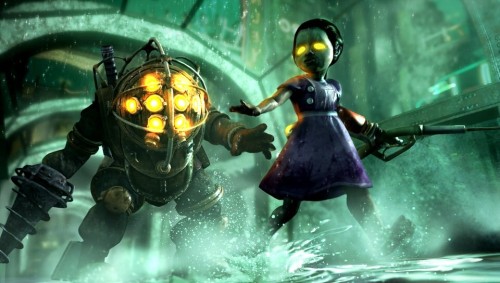
Clearly, things went wrong, but despite that, Andrew Ryan is still alive and stands by his objectivist beliefs. Ryan makes periodic radio contact with our protagonist reminding us of his (Rand’s) philosophies, especially concerning the importance of choice, free will, and selfishness. From the beginning of the game, we are contacted by another person, Atlas, who wants us first to find his family, and later to kill Ryan, and because we know nothing of the place in which we find ourselves the player is compelled to help Atlas – since he at least has a plan and some knowledge of the place.
We finally arrive to the main choice mechanic of the game, and it is a moral one. We come across a Little Sister and a Big Daddy every now and then. After defeating the Big Daddy we must choose whether to harvest the Little Sister, which means killing her and taking all her Adam (the gene manipulating currency we need in order to upgrade our character) or whether to rescue the little sister and in effect turn her back into a little girl.
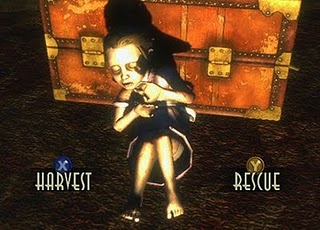

The thing is we receive twice as much Adam from harvesting one of these girls compared to when we save them, and so, in order to progress and survive, there are good reasons for acting in what can be conceived as an Objectivist manner and harvest the Little Sister. This is interesting, since the design of Rapture itself strikes as a general criticism of the Randian Objectivism. And so we must chose to act selfishly, or altruistically.
In his blog “Ludonarrative Dissonance in Bioshock”, Clint Hocking makes a very valid argument for why choosing to harvest the Little Sisters correlate well with:
“the values underlying Randian rational self-interest”
He goes on to critique what he believes to be a dissonance between the games ludic elements and its narrative. This critique is based on the fact that we in the game may be compelled to follow our own self-interest, but at the same time find that we have to follow the instructions of Atlas in order to progress through the game, despite Atlas being mostly opposed to Ryan and his philosophies. The problem, Hocking argues, is that we aren’t given the choice between helping Ryan or helping Atlas.
The reason why we have no choice, is woven into the fabric of the narrative, and done so in a way quite to my personal liking, although this may also be up for debate.
Towards the end of the game, we do find Ryan, but also discover the true nature of our own identity. Jack is himself a product of Rapture, sent up to Earth’s surface until needed. The plane crash that the game started with had been manufactured in order to get us back to Rapture. It turns out that Atlas is actually a man named Fontaine (A sort of gangster who wanted power in Rapture), it was Fontaine who sent Jack to the surface, and it was Fontaine who added a trigger in Jack’s genetics that compels Jack to obey any order that is preceded by the sentence “would you kindly”. And so, we realise that every time Atlas spoke to us and requested Jack to do something, we never actually had any other choice but to obey.
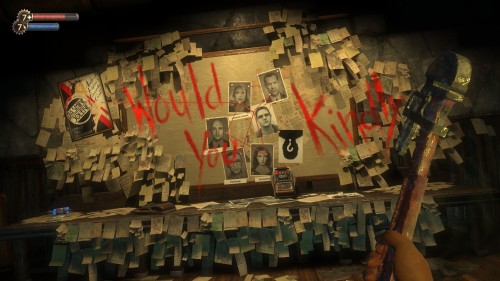
Hocking again criticises this, seeing it as a way of mocking the player for suspending his or her disbelief and accepting the previously discussed issues. Again, I must find myself in disagreement. Let’s again say we follow the objectivist approach to the game and act in a selfish manner. Atlas is helping us out and guiding us, and he is in fact the only person helping us – as such, it is only in our own self-interest to help him, as he at least knows Rapture. In my mind, it beats wondering around an entire city all by your lonesome like some headless chicken. Moreover, the argument about helping Ryan seems flawed to me. Even if we do find ourselves in agreement, at least in the game, with Ryan’s philosophies, this does not translate into immediate loyalty to the man – especially not since Ryan throughout the first part of the game is suspicious, dismissive and directly aggressive towards us. This is why I don’t have an issue with not being given the choice, and especially not when finding out that our every action has been guided by the phrase “would you kindly”.
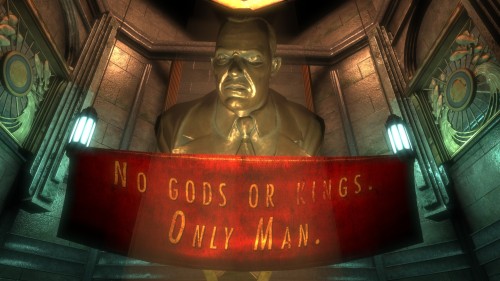
I actually think this plot twist adds something interesting to the game as a whole. It asks questions of us as gamers – reminding us that we are playing a game, adding a meta layer, which means that we have to play by the rules of the game if we wish to complete it. The only other real alternative is to turn it off. It reminds us that the choice we make in these games aren’t always as important as the thoughts that such presumed choices provoke.
This narrative prompt also ties in nicely with the actual special constraints of Bioshock. What previously in the game might just have seemed like a door that couldn’t open because, well, the level didn’t include that particular rooms now assumes a different meaning. It is instead simply an area that is too far away from the immediate goal that Atlas gave us, and therefore there is a part of or characters cognitive functions that prevents him from moving any further astray. In other words, we aren’t limited by the physical design of the game, but by the psychological prompts delivered by Atlas in the narrative (of course it is actually a case of physical constraints in the game, but this other explanation is just a bit more interesting when considering the gaming experience). So even though I think the criticism on the game offered by Hocking was interesting, I also thought a counter-argument was needed to add nuance to the matter.
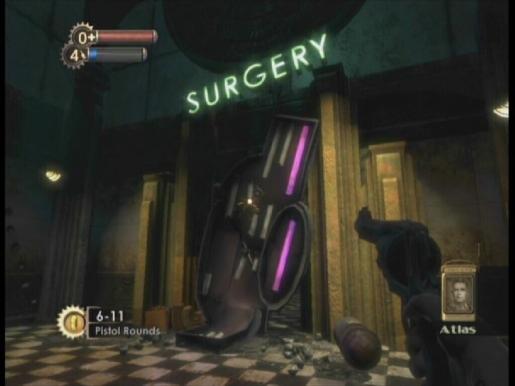
All in all the game can be seen as an immersive critique of Randian Objectivism that illustrates just how bad things can turn if everyone is looking out for number one. And, whether you decided to harvest or rescue the Little Sisters you find yourself fighting the tyranny that grew from Rapture, encapsulated in the further corruption of Fontaine.
Personally, I couldn’t make myself harvest the Little Sisters, especially not after rescuing the first one and seeing her turn into a normal girl again. There was of course the risk of them being retransformed once again, but at that point and time it was a risk I was willing to take, as I couldn’t know for sure. This whole game discusses the possibilities of true free will, especially with the “would you kindly” phrase, and so it seems rather fitting that the games ending should be determined by the one free choice we are given in the game, namely, what we do to these girls.
I got the “good” ending, which was a cute if not a bit of an idealistic happy ending.
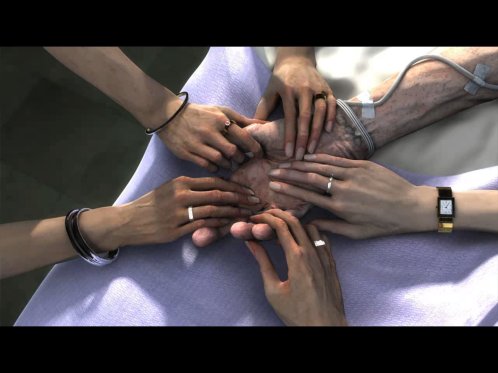
There is a tonne of things worth discussion about this game, and I merely scratched the surface when it comes to its narrative. So, if you have any counter-points to the ones I made, or ideas to
